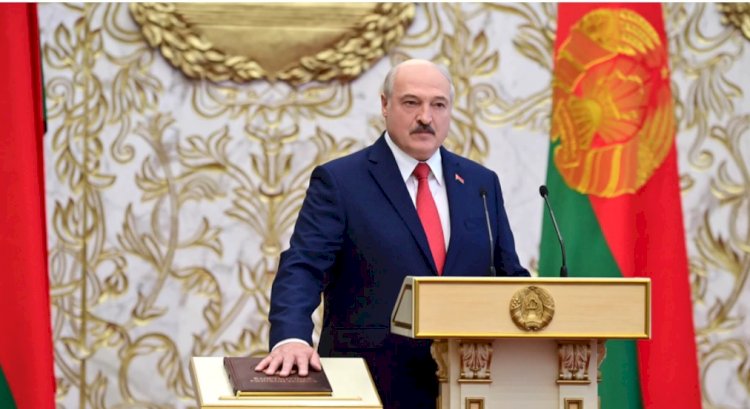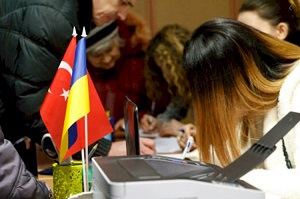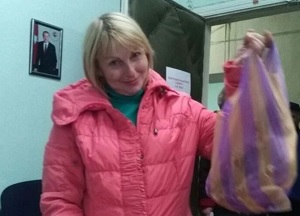After Belarus' Contested Election, a Secret Inauguration
Yet for all Lukashenko’s insistence on a mandate, there were few signs of celebration.

After Belarus' Contested Election, a Secret Inauguration
MOSCOW - Belarusian leader Alexander Lukashenko claimed the formal beginning of his 6th presidential term in office on Wednesday — holding a secret inauguration ceremony in defiance of mass demonstrations demanding an end to his 26-year rule in the wake of controversial elections last month.
Lukashenko insists he won the August 9 election in a landslide — garnering 80% of all ballots — despite widespread claims at home and abroad the vote was heavily rigged to keep him in power.
“We didn’t simply choose a president. We defended our values our peaceful life, our sovereignty, and our independence,” said Lukashenko in addressing a grim audience of several hundred officials bussed in for the occasion.
“I cannot, I have no right to abandon Belarusians.”
Yet for all Lukashenko’s insistence on a mandate, there were few signs of celebration.
The ceremony took place with little advance warning — the news breaking when the state Belta news agency announced Lukashenko had "taken office as President of Belarus."
Authorities shut down the capital, Minsk, for Lukashenko’s motorcade in advance of the event. The event was not broadcast on state television.
Neither were foreign dignitaries — including representatives Russia, Lukashenko’s closest ally — on hand.
Opposition reacts
Within hours, Sviatlana Tikhanouskaya — Lukashenko’s main rival in the election — issued her own statement rejecting the event as a “farce.”
“Today, hidden from the people, Lukashenko tried to carry out his own inauguration,” said Tikhanouskaya, calling him neither the “legal nor legitimate head of Belarus.”
“I — Sviatlana Tikhanouskaya — am the sole leader who was elected by the Belarusian people. And our goal is now to build a new Belarus together.”
Tikhanouskaya has repeatedly insisted she has no intention of remaining in office — instead saying she would call for free and fair elections once Lukashenko had been removed from power.
Several European nations — including Germany, Denmark, and the Baltic nations — announced they would no longer recognize Lukashenko’s government.
“The fact that this ceremony took place secretly and without the participation of society — is very telling,” said Steffen Seibert, the German government's official spokesperson in a statement first reported by the Interfax news agency.
“After that, Lukashenko can no longer count on any democratic legitimacy,“ added Seibert.
The EU has called for sanctions against those responsible for vote manipulating and subsequent violence against peaceful protesters.
Russia — which has been Lukashenko’s main backer amid the political turmoil — made no formal statements but has previously said it recognizes Lukashenko as the legitimate leader of the country for now.
Minsk braces for protests
The opposition immediately called for protesters to swarm the streets of the capital Wednesday evening — building on a pattern of civic disobedience that participants have billed as a “national reawakening.”
For six weeks in row, hundreds of thousands have rallied to demand Lukashenko’s resignation over what they argue was a deeply flawed election.
Key candidates were arrested ahead of the vote — including Tikhanouskaya’s husband — which prompted her surrogate candidacy.
Public anger has also stewed over a crackdown in the wake of the vote that has seen over 7,500 arrests and police violence against protesters.
Hundreds have emerged from police custody with searing bruises and tales of torture at the hands of Lukashenko’s security agents.
Lukashenko’s response has to been to target remaining leaders of the opposition in recent weeks. He has also labeled the democratic uprising a western-backed plot aimed at expanding NATO’s presence eastward in a bid to secure Russian backing.
In a meeting with President Vladimir Putin in the Russian resort city of Sochi earlier this month, Putin offered a degree of support to his beleaguered Belarusian counterpart — including $1.5 billion in loans and the presence of Russian paratroopers.
Less clear, argue observers, is whether the Kremlin sees Lukashenko as a sustainable partner for the long term.
Despite being nominal allies, Minsk and Moscow have clashed over issues ranging from gas politics and the response to the coronavirus to the timetable for a long delayed supra union state between the two countries.
Political analysts in Moscow argued the Kremlin would view Lukashenko’s hidden inauguration as a sign of further weakness.
“This kind of president the Kremlin doesn’t need,” wrote analyst Alexei Malashenko of the Institute of Dialogue of Civilizations, in a post to the Echo of Moscow radio website.
“It’s not decent to have dealings with a ‘head of government’ who’s afraid of his own inauguration,” he added.
VOA








































